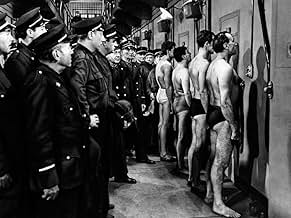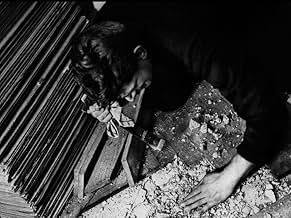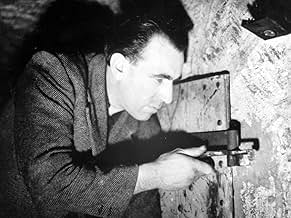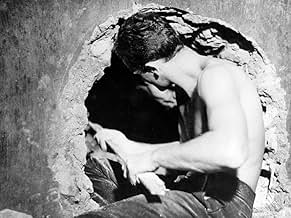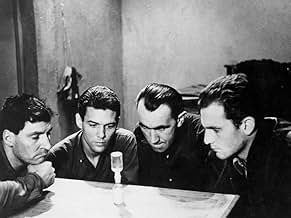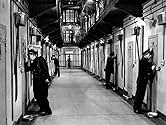Le trou
- 1960
- Tous publics
- 2h 11min
NOTE IMDb
8,5/10
22 k
MA NOTE
Gaspard, récemment incarcéré, est transféré dans une cellule où quatre détenus qui purgent une longue peine prévoient de s'évader en creusant un tunnel.Gaspard, récemment incarcéré, est transféré dans une cellule où quatre détenus qui purgent une longue peine prévoient de s'évader en creusant un tunnel.Gaspard, récemment incarcéré, est transféré dans une cellule où quatre détenus qui purgent une longue peine prévoient de s'évader en creusant un tunnel.
- Réalisation
- Scénario
- Casting principal
- Nomination aux 2 BAFTA Awards
- 2 victoires et 4 nominations au total
Marc Michel
- Claude Gaspard
- (as Mark Michel)
Jean-Paul Coquelin
- Le lieutenant Grinval
- (as J. Paul Coquelin)
Albert Augier
- Un gardien
- (non crédité)
Jean Becker
- Un gardien
- (non crédité)
Mick Besson
- Deuxième plombier
- (non crédité)
Georges Bielec
- Figurant
- (non crédité)
Raymond Bour
- Un gardien
- (non crédité)
Philippe Dumat
- Un gardien
- (non crédité)
Gérard Hernandez
- Le détenu à l'infirmerie
- (non crédité)
Jean Luisi
- Un détenu
- (non crédité)
Avis à la une
Jacques Becker's "Le Trou" is one of the greatest of all prison-break films. No film lover should miss it. It is every bit as masterful and tense as other milestones of this subgenre, including John Sturges' "The Great Escape," Robert Bresson's masterpiece "A Man Escaped," and Don Siegel's "Escape from Alcatraz." The meticulous preparation for the escape is a nail-biter, with many adrenaline-inducing close calls. The ringer: Will the newly exonerated prisoner stay with the group and escape or rat on the others? Those seeking pure entertainment or those seeking existentialist philosophical fare will be equally pleased. A memorable movie experience.
I watched this masterpiece first time before 10 years and I was stunned. Now, I watched it before few days again and I am really surprised how this remarkable movie functions and become better and better. It is really ingenious portrait of human interaction and cooperation, great "prison-escape" drama that bring us unique way of telling story (in long shots) looking so realistic and powerful.
One of the best movies I've ever seen!
10/10
One of the best movies I've ever seen!
10/10
10pzanardo
Probably, to really get "Le Trou", this splendid, intense movie, you have to be conscious that the great Jacques Becker was dying during the making of the film. A quiet stoicism permeates this work of art. The story is supposed to be very sad, but it isn't. The guys on the screen are too tough, by no means apt to mourn their dire destiny or, metaphorically, to ask for the viewer's sympathy.
We have the true story of the hole dug by a bunch of in-mates to escape from a jail in Paris. The screenplay is taken from a novel of the distinguished writer and film-maker Jose' Giovanni, himself formerly a convict. Becker chooses to tell the story in the simplest, neatest possible way. No music at all, an essential, dry, sharp yet powerful dialog. The in-mates do their job, to try to escape. The director avoids the annoying cliché, typical of the American jail-movies, of showing the wardens as sadistic torturers. They are tough and strict, they don't like but they feel no hate for the prisoners. The wardens just do their job, that's all. In fact, there are no really despicable characters in the film. At his last appointment with the art of cinema, Becker seems to accept and forgive all human beings.
A brilliant idea is to show how the guys turn common objects and waste iron into the tools needed for the escape (a key, a lamp, a pick, a sand-glass). The little periscope made with a tooth-brush gives raise to a shocking scene, few seconds of great cinema. We follow the in-mates' apparently endless, exhausting labor of digging and sewing. That should be rather boring for the viewer, but it isn't. How comes there's not a single moment of bore in the film? That's the privilege of Art.
The work of the camera and the black and white photography are sensational, and convey the intense emotions of the characters. The psychological study is made in such an understated way that you may overlook it at a first view. But, after seeing the movie a second time, and knowing the development of the story, you fully appreciate how the psychology of the characters is treated, with accuracy and depth. The actors make an excellent job. This is stunning, thinking that "Le Trou" was the first movie for Philippe Leroy and Michel Constantin, later prominent actors of French cinema. And Jean Keraudy wasn't a professional actor, he was one of the in-mates that actually dug the hole fourteen years earlier! (at least, this is stated by himself at the beginning of the movie, and is testified in several books on French cinema)
Are there deep messages in the film? Two wardens bring a fly to feed a spider. There is the spider, a patent symbol of death, ghastly in its immobility. Two prisoners are peeping and wondering: what the hell are the wardens doing? Got no idea. And who cares, after all? Maybe that is Becker's dry, ironic message. Don't be too deep. Fight against bad luck, be stoic and brave. Who cares, after all?
My opinion is that the artist Becker, displaying the same toughness of the guys on the screen, just fought to leave us a major work of art. Our task of viewers is to enjoy and love it. "Le Trou" is an unforgettable film, which honors the art of cinema.
We have the true story of the hole dug by a bunch of in-mates to escape from a jail in Paris. The screenplay is taken from a novel of the distinguished writer and film-maker Jose' Giovanni, himself formerly a convict. Becker chooses to tell the story in the simplest, neatest possible way. No music at all, an essential, dry, sharp yet powerful dialog. The in-mates do their job, to try to escape. The director avoids the annoying cliché, typical of the American jail-movies, of showing the wardens as sadistic torturers. They are tough and strict, they don't like but they feel no hate for the prisoners. The wardens just do their job, that's all. In fact, there are no really despicable characters in the film. At his last appointment with the art of cinema, Becker seems to accept and forgive all human beings.
A brilliant idea is to show how the guys turn common objects and waste iron into the tools needed for the escape (a key, a lamp, a pick, a sand-glass). The little periscope made with a tooth-brush gives raise to a shocking scene, few seconds of great cinema. We follow the in-mates' apparently endless, exhausting labor of digging and sewing. That should be rather boring for the viewer, but it isn't. How comes there's not a single moment of bore in the film? That's the privilege of Art.
The work of the camera and the black and white photography are sensational, and convey the intense emotions of the characters. The psychological study is made in such an understated way that you may overlook it at a first view. But, after seeing the movie a second time, and knowing the development of the story, you fully appreciate how the psychology of the characters is treated, with accuracy and depth. The actors make an excellent job. This is stunning, thinking that "Le Trou" was the first movie for Philippe Leroy and Michel Constantin, later prominent actors of French cinema. And Jean Keraudy wasn't a professional actor, he was one of the in-mates that actually dug the hole fourteen years earlier! (at least, this is stated by himself at the beginning of the movie, and is testified in several books on French cinema)
Are there deep messages in the film? Two wardens bring a fly to feed a spider. There is the spider, a patent symbol of death, ghastly in its immobility. Two prisoners are peeping and wondering: what the hell are the wardens doing? Got no idea. And who cares, after all? Maybe that is Becker's dry, ironic message. Don't be too deep. Fight against bad luck, be stoic and brave. Who cares, after all?
My opinion is that the artist Becker, displaying the same toughness of the guys on the screen, just fought to leave us a major work of art. Our task of viewers is to enjoy and love it. "Le Trou" is an unforgettable film, which honors the art of cinema.
Jacques Becker's swan song is a real gem of a film. Le Trou has such an amazing kinetic rhythm to it that one both feels and forgets the claustrophobic environs. Based on a real story turned into a novel by one of the "escapees", the film has excellent casting, wonderful (candel-lit!) cinematography and crisp dialog among its other advantages.
The director was terminally ill during the shoot and was to die after making the final cut. Watching this classic now some four decades since auteur's death, one can only wonder what an artist it would take to demand and achieve such breathtaking perfection in art while combating death at the same time.
Do not let yourself be put off by "yet another prison-movie!" talk. It is too good to be just that. So much so that it could merit comparison with Bresson's "A Man Escaped". A very deserving 10 out of 10.
The director was terminally ill during the shoot and was to die after making the final cut. Watching this classic now some four decades since auteur's death, one can only wonder what an artist it would take to demand and achieve such breathtaking perfection in art while combating death at the same time.
Do not let yourself be put off by "yet another prison-movie!" talk. It is too good to be just that. So much so that it could merit comparison with Bresson's "A Man Escaped". A very deserving 10 out of 10.
Before his life was cut short prematurely, Director Jacques Becker created his very personal film, "Le Trou" ("The Hole"). Using mostly then nonprofessional actors, M. Becker elicited extremely naturalistic and powerful performances in a reportedly true-life prison-escape drama set in France.
It was especially interesting to see Marc Michel in his film debut. Made four years before Michel scored a hit as Roland in "Les Parapluies de Cherbourg," Michel here subtely creates a fascinating character. His work is seemingly effortless, yet always intriguing. He stands at the center of a group of convicts planning a daring escape--a group which has difficulty in fully trusting his loyalty.
The routine of prison life as well as the actual escape is done with such detail that the viewer feels part of the action. The black-and-white photography enhances the realism of the presentation, done without a musical background.
Generally a "forgotten film," "Le Trou" is a carefully constructed prison drama, most convincingly executed. It is a credit to both a hard working cast and director.
It was especially interesting to see Marc Michel in his film debut. Made four years before Michel scored a hit as Roland in "Les Parapluies de Cherbourg," Michel here subtely creates a fascinating character. His work is seemingly effortless, yet always intriguing. He stands at the center of a group of convicts planning a daring escape--a group which has difficulty in fully trusting his loyalty.
The routine of prison life as well as the actual escape is done with such detail that the viewer feels part of the action. The black-and-white photography enhances the realism of the presentation, done without a musical background.
Generally a "forgotten film," "Le Trou" is a carefully constructed prison drama, most convincingly executed. It is a credit to both a hard working cast and director.
Le saviez-vous
- AnecdotesThe scene where three different characters take turns breaking through the concrete floor of their cell is filmed in a single, nearly four minute long, shot.
- GaffesWhen Geo checks the corridor with the mirror and takes a break to say goodbye to his cellmates, he leaves the mirror in the hole. However, when he goes back to checking the corridor he has to stick the mirror back into the hole first.
- Citations
[last lines]
Roland Darban: [stripped, facing the wall under guard] Poor Gaspard.
- ConnexionsFeatured in Mon père, il m'a sauvé la vie (2001)
Meilleurs choix
Connectez-vous pour évaluer et suivre la liste de favoris afin de recevoir des recommandations personnalisées
- How long is The Hole?Alimenté par Alexa
Détails
Box-office
- Montant brut aux États-Unis et au Canada
- 34 588 $US
- Week-end de sortie aux États-Unis et au Canada
- 6 756 $US
- 2 juil. 2017
- Montant brut mondial
- 34 588 $US
- Durée
- 2h 11min(131 min)
- Couleur
- Rapport de forme
- 1.66 : 1
Contribuer à cette page
Suggérer une modification ou ajouter du contenu manquant



